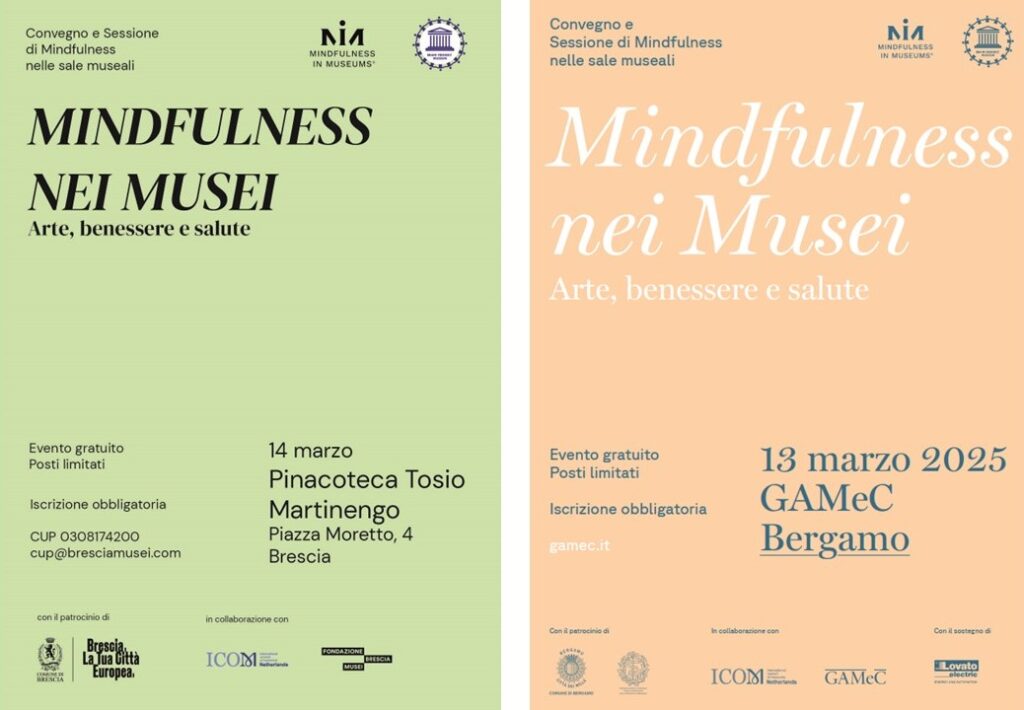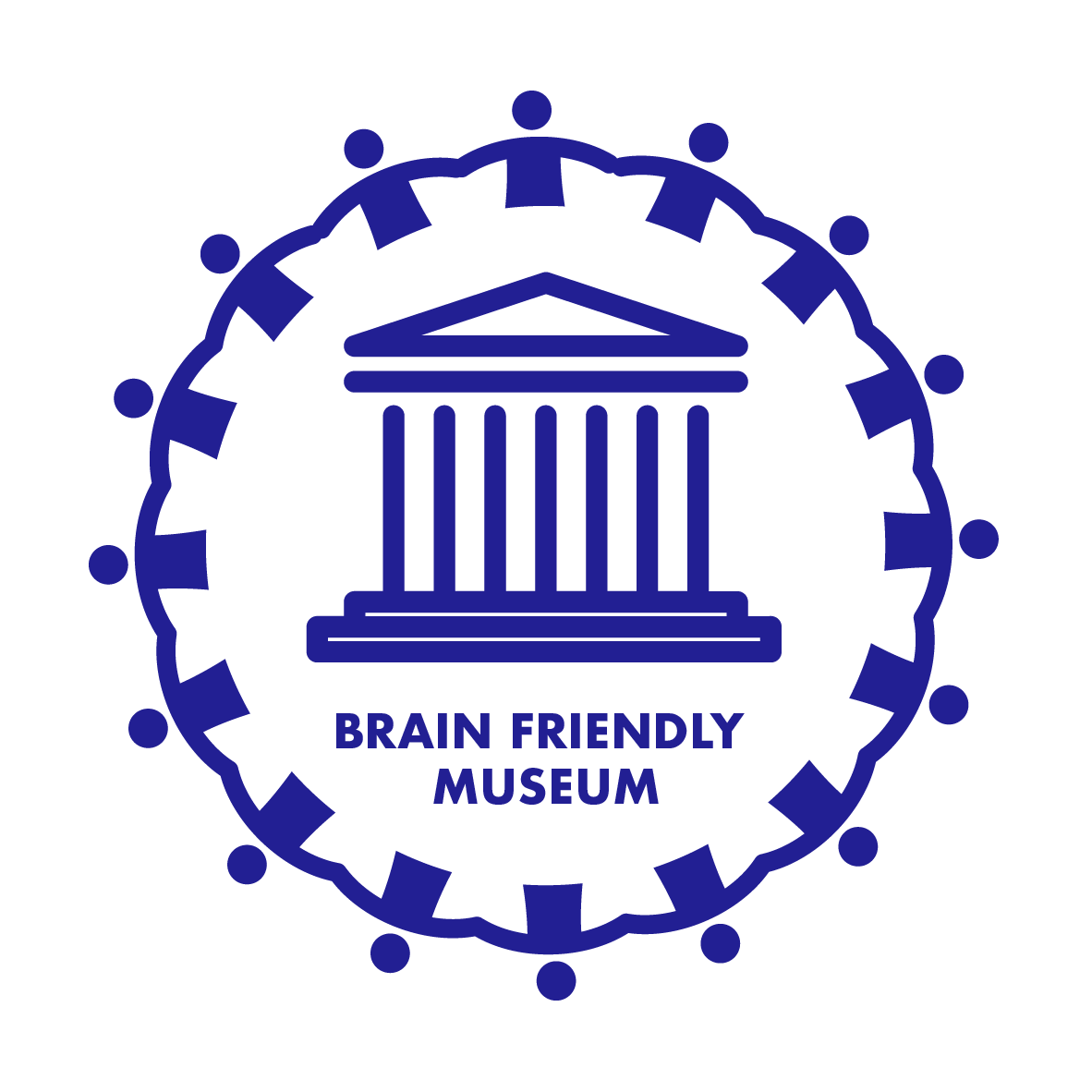MINDFULNESS IN MUSEUMS
ART, WELLBEING, AND HEALTH

Wednesday 12 March 2025
MAUTO – National Automobile Museum | Turin (Italy)
Thursday 13 March 2025
GAMeC – Gallery of Modern and Contemporary Art | Bergamo (Italy)
Friday 14 March 2025
Pinacoteca Tosio Martinengo | Brescia (Italy)
These events have been organised in collaboration with ICOM Netherlands.
MAUTO – National Automobile Museum | Turin (Italy)
Thursday 13 March 2025
GAMeC – Gallery of Modern and Contemporary Art | Bergamo (Italy)
Friday 14 March 2025
Pinacoteca Tosio Martinengo | Brescia (Italy)
These events have been organised in collaboration with ICOM Netherlands.
An event dedicated to the practice of Mindfulness in museums, featuring Italian and international experts.
On 13 and 14 March 2025, two events will be held focusing on Mindfulness in museums, offering an opportunity to explore the connection between art, wellbeing, and awareness under the guidance of Italian and international Mindfulness instructors.
Each event will begin with a theoretical discussion, featuring contributions from medical professionals, museum staff — who will present their wellbeing initiatives — Mindfulness instructors, and the coordinator of the ASBA Project (Anxiety and Stress are now ‘treated’ in museums). This will be an opportunity to delve into the role of Mindfulness and contemplative practices within museum spaces, as well as their positive impact on mental health and stress reduction.
The second part of the event will be dedicated to a direct experience of Mindfulness within the museum galleries, in close contact with the artworks. Participants will be guided by Mindfulness instructors and museum staff through an immersive journey designed to foster full awareness of the present moment, stimulated by encounters with the displayed collections.
The events will be held in Italian and English, with Italian translation available.
https://www.gamec.it/mindfulness-nei-musei-arte-benessere-e-salute/
ASBA PROJECT. INNOVATION AND WELLBEING FOR CITIZENS AND MUSEUM STAFF
Tuesday 18 February 2025
9.30 a.m. – 5.30 p.m. CET
Palazzo Reale
Piazza Duomo 14 – Milan, Italy
Free Access
9.30 a.m. – 5.30 p.m. CET
Palazzo Reale
Piazza Duomo 14 – Milan, Italy
Free Access
Wellbeing enters Italian museums with the ASBA Project (Anxiety, Stress, Brain-friendly museum, Approach): an interdisciplinary programme that aims to engage museum collections and institutions as key spaces for fostering community wellbeing through Mindfulness, Art Therapy, Visual Thinking Strategies, the Art Up method, the Nature+Art method, and Chair Yoga.
Today, museums are called upon to experiment with new ways of engaging visitors, embracing innovation and creativity to enhance the quality of life of the public. Museum institutions can play a crucial role in the development of a wellbeing-oriented global strategy, addressing individual needs and transforming museums into social and emotional spaces where art and science create opportunities for encounters between people, cultures, and experiences.
On 18 February 2025, at Palazzo Reale in Milan, the results of the three-year research conducted by experts involved in the ASBA Project, as well as researchers from CESPEB, the University of Milano-Bicocca, and the University of Milan, will be presented. The discussion will be further enriched by a panel of international experts. Representatives from the United States, France, Portugal, Greece, and the United Kingdom will share their experiences in the museum sector, engaging in a dialogue with the Italian case study.
The methodologies adopted by ASBA, such as Art Therapy and Mindfulness, have been applied in various museums to demonstrate their effectiveness in different contexts.
ASBA is based on a research protocol approved by the Ethics Committee of the University of Milano-Bicocca.
Programme
9.30 a.m. – 1 p.m.
OPENING REMARKS
Domenico Piraina, Director of Culture, Municipality of Milan; Director, Exhibitions and Scientific Museums Area
Paola Zatti, Head Curator, Gallery of Modern Art, Milan
Chiara Fabi – Head of the Scientific Museums Unit, Milan
Davide Quadrio, Director, Museum of Oriental Art, Turin
Vittorio Sironi, Director, CESPEB – University of Milano-Bicocca
Annalisa Banzi, Founder and Coordinator of the ASBA Project, CESPEB – University of Milano-Bicocca
“ARTS ON PRESCRIPTION”.
FROM INTERNATIONAL EXPERIENCES TO THE NEXT STEPS FOR ITALY
10.30 a.m. Social Prescribing through Arts, Nature, and Community Engagement for Mental Health and Wellbeing – Sónia Dias, Dean and Professor at the National School of Public Health – NOVA University Lisbon, Portugal
10.40 a.m. The People’s Museum: working together to create a great museum for everyone – Emily Bradfield PhD, Practitioner Research Associate: Collections and Wellbeing (Older Adults), The Fitzwilliam Museum, University of Cambridge
10.50 a.m. The Museum as a Tool for Social Connection and Well-Being in Patient Care Pathways – Marie Vidal de la Blache, art-health, accessibility and inclusivity project manager. Palais des Beaux-Arts de Lille, France
11 a.m. Art and Health: Why Does It Work? A Psychoneuroendocrinoimmunological Approach – Pierluigi Sacco, Professor at the “G. d’Annunzio” University of Chieti-Pescara and Founding Member of the Cultural Welfare Center
11.10 a.m. Museums, Health, and Wellbeing: A Special Relationship – Enzo Grossi, Bracco Foundation, Milan
Break
MUSEUMS AND WELLBEING
11.30 a.m. Dance with the Fitzwilliam Museum: a different way of encountering Art – Filipa Stubbs, freelance dance artist working with the Cambridge University Museums Consortium
11.40 a.m. Art Psychotherapy at ΕΜΣΤ | National Museum of Contemporary Art, Athens – Elisabeth Ioannides, EΜΣT Education Curator – Art Psychotherapist
11.50 a.m. Our duty of caring – Tamsin Russell, Workforce Development Lead, Museums Association, UK
MUSEUMS AS THERAPY: THE EXPERIENCE AND DATA FROM THE ASBA PROJECT ON ANXIETY, STRESS, AND WELLBEING
12 p.m. The ASBA Project for adult citizens and museum staff – Annalisa Banzi PhD, Researcher at the Centre for Studies on the History of Biomedical Thought (CESPEB), University of Milano-Bicocca
12.10 p.m. Interview conducted by Giulio Corrado with the Ambassadors of the ASBA Project: Gessica Corbella, archaeologist and Communication Manager for MuseoCity ETS, and Manuela Sanguini, President of AIDM Milan
Moderator: Luigi Di Corato, Director of the Culture Division of the City of Lugano, Switzerland
Break
2 p.m – 5.30 p.m.
2 p.m. Testimony from the museum staff of the participating museums, Mia Landi and Alberto Corvi, facilitated by Lucia Cataldo, Professor of Museology at the Academy of Fine Arts of Verona and Macerata
The Methods of the ASBA Project
Mindfulness
2.30 p.m. Evidencing the wellbeing benefits of mindful spaces in a public art museum with researchers – Louise Thompson, Museums and Wellbeing Consultant, Mindful Museums
2.40 p.m. Testimony from an Instructor of the ASBA Project – Lorenza Guidotti, Journalist and MBSR teacher
Art therapy
2.50 p.m. Arts in Medicine and Health Care at the Montreal Museum of Fine Arts – Stephen Legari, Educational Programs Officer – Art Therapy, Musée des beaux-arts de Montréal
3 p.m. Art Therapy is a Brain Based Profession: Update 2024 – Juliet King, Associate Professor Art Therapy at The George Washington University. Adjunct Associate Professor Neurology at Indiana University School of Medicine
3.10 p.m. Testimony from an Instructor of the ASBA Project – Michela Rolandi, Art therapist
Break
Visual Thinking Strategies
3.40 p.m. Testimony from an Instructor of the ASBA Project – Vincenza Ferrara, Professor at the Sapienza Università, Rome
Chair Yoga
3.50 p.m. Testimony from an Instructor of the ASBA Project – Maria Elide Vanutelli, Professor at the Università degli Studi di Milano-Bicocca, Milan
Nature+Art
4 p.m. The nature of colors: effects of freely drawing natural versus urban landscapes on behavioral and physiological measures of stress – Sjoerd Ebisch PhD, Professor at the “G. d’Annunzio” University of Chieti-Pescara
4.10 p.m. Testimony from an Instructor of the ASBA Project – Annalisa Banzi PhD, Researcher at the Centre for Studies on the History of Biomedical Thought (CESPEB), University of Milano-Bicocca
Experiential Methods of Inclusion
4.20 p.m. Museums as Healing Spaces: Mental Health through Cultural Engagement – Joana Henriques, Head of Education and Programmes, MAAT – Museum of Art, Architecture and Technology
4.30 p.m. The Role of the Place for the Illness Experience – Luis Madeira, co-coordinator of the Disciplinary Area of Psychiatry and Mental Health at the Faculty of Medicine of the Catholic University
4.40 p.m. Testimony from an Instructor of the ASBA Project – Elisabetta Franciosi, Founder of Art Up and Cipa Teaching Psychoanalyst
4.50 p.m. Presentation of findings from the ASBA Project sessions – Claudio Lucchiari, Professor at the Università degli Studi di Milano
Moderator: Chiara Teolato, Director La Venaria Reale, Turin
For research project information: Annalisa Banzi | annalisa.banzi@unimib.it
THE NEURON GOES TO THE MUSEUM.
INTERNATIONAL CONFERENCE DEVOTED TO THE APPLICATION OF NEUROSCIENCE TO THE VISITOR EXPERIENCE
Wednesday 4 October 2023
2:00 p.m. – 7:00 p.m. CET
IULM University – Milan, Italy
2:00 p.m. – 7:00 p.m. CET
IULM University – Milan, Italy
Neuroscience has become increasingly popular, offering insights into how the brain works and how humans behave. This conference aimed to explore the applications and potential implications of neuroscience within the museum field. Although there is still much to learn about the brain and its functions, we can already benefit from the findings neuroscientists have gathered. The complexity of the science of the brain requires discussions from experts with different backgrounds.
Why should museum experts learn about neuroscience?
As highlighted in the Brain-Friendly Museum book, consider a scenario where two friends visit a museum. They pay attention to the displayed objects and read the captions. They might compare these objects with others they’ve seen before, recalling information from long-term memory. They’ll use their language skills to discuss what they’re learning, influenced by their emotional state. They’ll also decide how much time to spend on the tour and may need to solve practical problems such as feeling thirsty, tired, or needing the restroom.
These are just a few examples of the brain processes that play a crucial role in human
cognition: each of them is essential for creating meaningful museum experiences.
By understanding cognitive processes and emotions, museums can avoid designing
experiences that may be ineffective.
Neuroscience can help develop new criteria for measuring the value of museums because its tools can assess critical issues such as visitors’ wellbeing and cognitive processes.
Conference structure
The conference was divided into four sections, serving as an introduction to neuroscience:
- addressed fundamental questions about the science of the brain
- provided practical examples of how neuroscience tools can be used in museums
- considered the benefits and challenges of applying neuroscience in cultural setting of museums
- explored how neuroscience can be a central theme in exhibitions
Organising committee: Annalisa Banzi (art historian), Riccardo Manzotti (engineer and philosopher), and Giuliano Gaia (museum consultant).
For further information please check the links:
https://www.sdc.iulm.it/en/news-ed-eventi/news/neuron-goes-museum
https://www.youtube.com/watch?v=KRJoxDoSAPw
https://www.youtube.com/watch?v=-fLlBlbobYA
